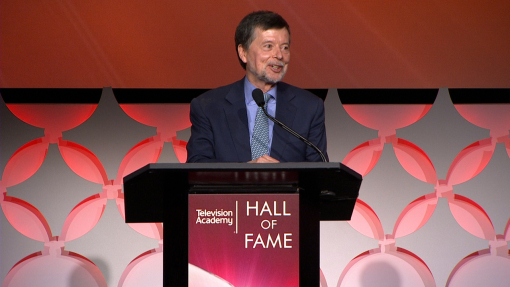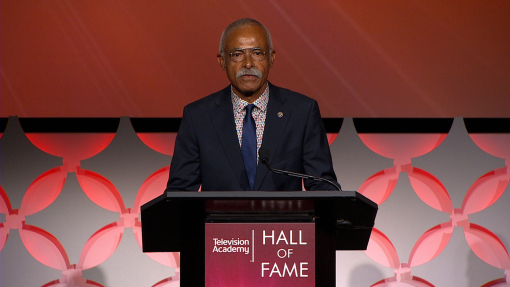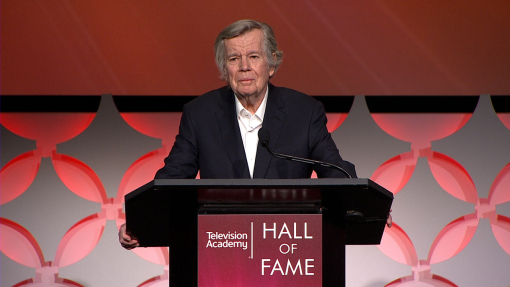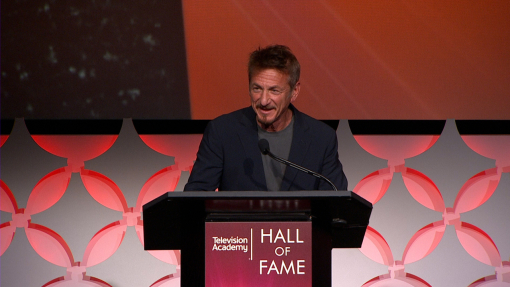An executive whose influence was rivaled only by his exuberance for his work, Brandon Tartikoff was responsible for some of the most successful, beloved, and critically-acclaimed series in television history. As president of NBC's entertainment division from 1980 to 1991 — the longest tenure of anyone to hold that position — he took a network languishing in the doldrums and turned it into a dynasty. It is a tribute to Tartikoff, who died in 1997 at age 48 after his third bout of cancer, that the impact of his achievement is still evident today.
Born January 13, 1949, in Freeport, New York, Tartikoff was the quintessential TV kid who in his youth is said to have fantasized about one day succeeding Ed Sullivan. As Tartikoff's wife Lilly, who has raised millions of dollars for cancer research through her work with the annual Revlon Fire & Ice Ball and other philanthropic endeavors, puts it, "Brandon was destined to play a part in television. When he was a boy, he told his mother that they miscast Dennis the Menace."
Upon graduation from Yale, Tartikoff became director of promotions at WTNH, a local television station in New Haven, Connecticut, and two years later was made director of advertising and promotions at ABC's Chicago affiliate, WLS-TV. At ABC, his inspired promotional style drew the attention of network president Fred Silverman, who in 1976 appointed Tartikoff manager of dramatic development. In 1980, Silverman, who by then had moved to NBC, hired Tartikoff as head of NBC's entertainment division.
At 30, he was the youngest person ever to hold that position, but he was more than up to the task. "If he could have lived inside that television, he would have,” Lilly says with a laugh. “He wanted to open that set and jump inside, and his passion was infectious. People during that time in the ‘80s and ‘90s talked in terms of having balance in their lives, but that word was not in Brandon's vocabulary. He was a man with a mission, and he was going to have an impact on television one way or another.”
When Tartikoff arrived at NBC, it was the number-three network, and had not held the number-one spot in 30 years. But by 1985, he had elevated it to first place, a position it would hold for six consecutive years. The comeback was fueled by the success of groundbreaking dramas like Hill Street Blues, St. Elsewhere, and L.A. Law, and hit sitcoms like Family Ties, The Golden Girls, and especially The Cosby Show.
As an executive, Tartikoff's willingness to bet on his gut often reaped tremendous dividends, and The Cosby Show is a vivid case in point. The inspiration was simple: He was up late one night, happened to catch Bill Cosby performing stand-up on The Tonight Show With Johnny Carson, and was so taken by Cosby's wry take on parenthood that he commissioned a show built around the veteran star's life as a befuddled family man.
"At that time," says Lilly Tartikoff, "people were saying that half-hour comedies were dead. Of course, the minute they said that, Brandon was determined to bring them back."
Did he ever. The Cosby Show not only resuscitated the genre, it became the cornerstone of a powerhouse lineup that gave NBC a virtual lock on Thursday nights — a dominance that endured for nearly two decades. Indeed, in many respects The Cosby Show laid the groundwork for NBC's Thursday-night success of Cheers, Seinfeld, and Friends, and helped to define the network's identity for millions of viewers.
Tartikoff was renowned for communicating program concepts with a rare combination of brevity and clarity. On one occasion his two-word pitch to producer Michael Mann — "MTV Cops" — resulted in another zeitgeist-defining show, Miami Vice. And producer Stephen J. Cannell once said in an interview that The A-Team — a solid ratings hit — emerged from a conversation in which Tartikoff said, "We need a show sort of like The Wild Bunch — and Mr. T drives the truck."
As a scheduler, Tartikoff understood the importance of something-for-everyone variety, and consistently balanced critical hits like Hill Street Blues, St. Elsewhere, and L.A. Law with less challenging, but solidly performing, series like Diff'rent Strokes, The Facts of Life, and Alf. "That was the beauty of Brandon: he wasn't a snob," Lilly says.
“He said his shows were all his children, and he valued all of them equally. Of course he appreciated Cosby and Hill Street Blues. But he also appreciated 227, Knight Rider, and The A-Team. There was a reason for those shows, and an audience for those shows.”
Tartikoff was such a fixture at NBC that on occasion he even appeared on camera. In addition to cameos on the NBC series Saved By the Bell, Alf and Night Court, he guest-hosted Saturday Night Live in 1983. "He was waiting to be asked — and his performances were all awful!" Lilly recalls with fond amusement. "He was an executive trying to be an actor. It was hilarious, but he loved it. And he did not do it to please anybody but himself."
In 1991, after having dominated television for a dozen years, Tartikoff left NBC to give the movie business a shot as chairman of Paramount Pictures. After just 15 months on the job, during which the studio released such hits as Wayne's World and Clear and Present Danger, he resigned to spend time with his family after Calla, the older of his two daughters, was seriously injured in an automobile accident. Leaving Los Angeles behind, he moved to New Orleans, where his daughter had gone to recuperate.
Tartikoff's struggles with cancer had given him firsthand experience with the challenges of coping with life-threatening health problems. He was originally diagnosed with Hodgkin's Disease in his early twenties, and recovered after undergoing treatment, but he experienced a recurrence shortly after his move to NBC. In a show of remarkable courage and discretion, he kept the illness a secret, wearing a wig and false eyebrows throughout his debilitating chemotherapy treatments.
"It's hard to imagine what it's like to be in your early twenties and be told you have cancer," Lilly says, “but he wore it like a badge. It was just another challenge. He never spoke about it unless you had a friend or a cousin or a sister who had cancer and you called him privately. And then he would stop his day. And over a period of 25 years he did that hundreds of times. It isn't a club you want to be a member of, but once you are, it's a club that changes your life, and he always felt it made him a better person.”
In 1994, Tartikoff returned to show business as producer of the talk show Last Call, and that same year became head of New World Entertainment. He later formed his own production, dubbed H. Beale after the crazed news anchor played by Peter Finch in the blistering 1976 film Network, and in early 1997 was recruited by America Online to develop entertainment content for its Internet service. Unfortunately, his cancer returned that same year, and after months of treatment, he died on August 27, 1997.
For Brandon, television wasn't work; it was like breathing to him," says Lilly. “If kids came to the house, he would sit them down and ask them what shows they watched, and why. He loved television with all his might. He fell asleep literally with scripts all over him. I don't know, and I never will know, if he believed his time was limited, but he certainly acted like a man whose clock was ticking, and he didn't waste a minute.”
This tribute originally appeared in the Television Academy Hall of Fame program celebrating Brandon Tartikoff's induction in 2004.











